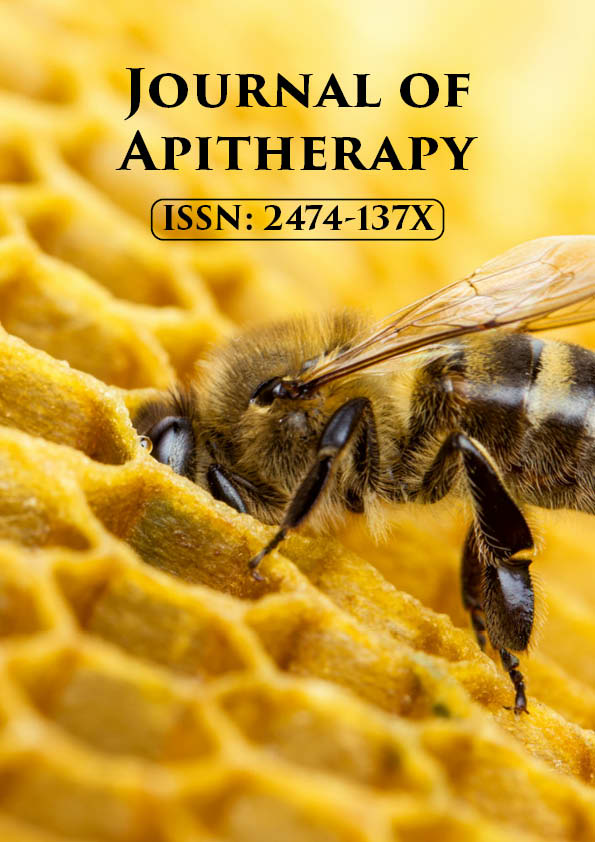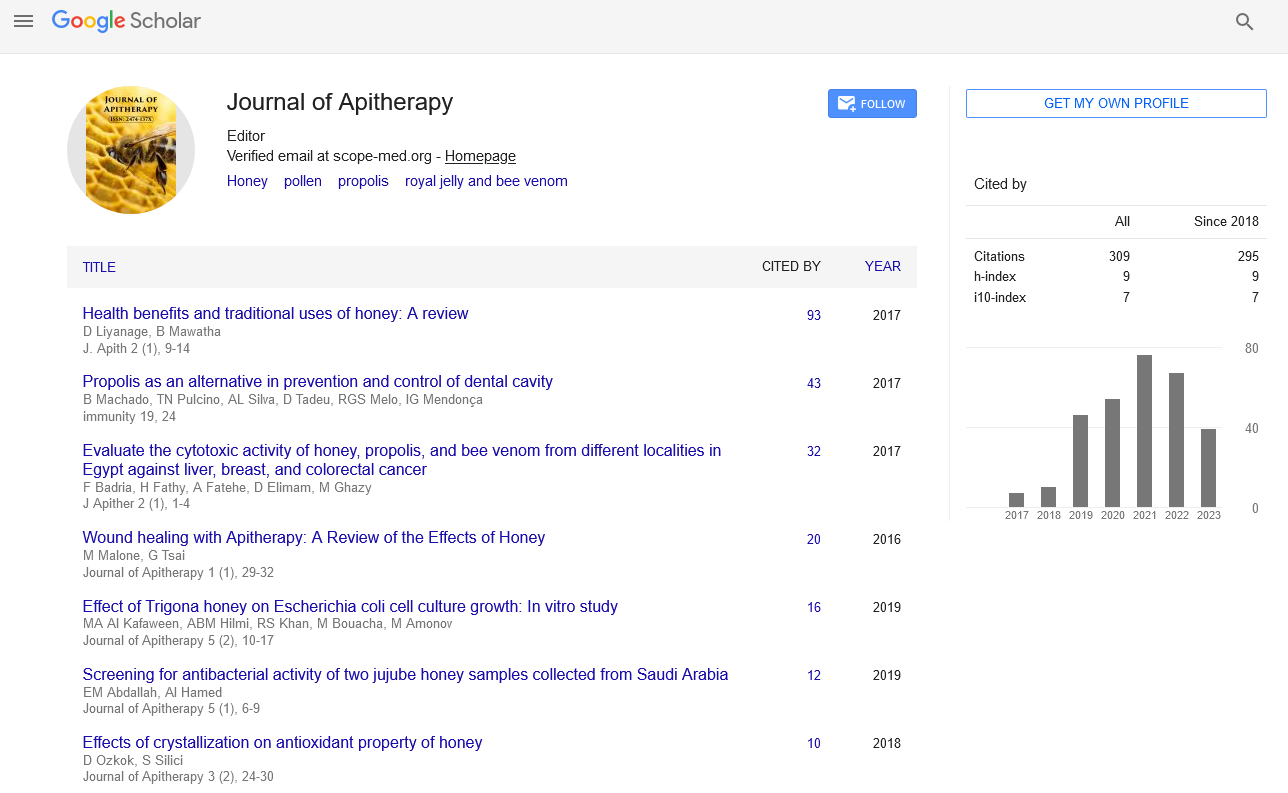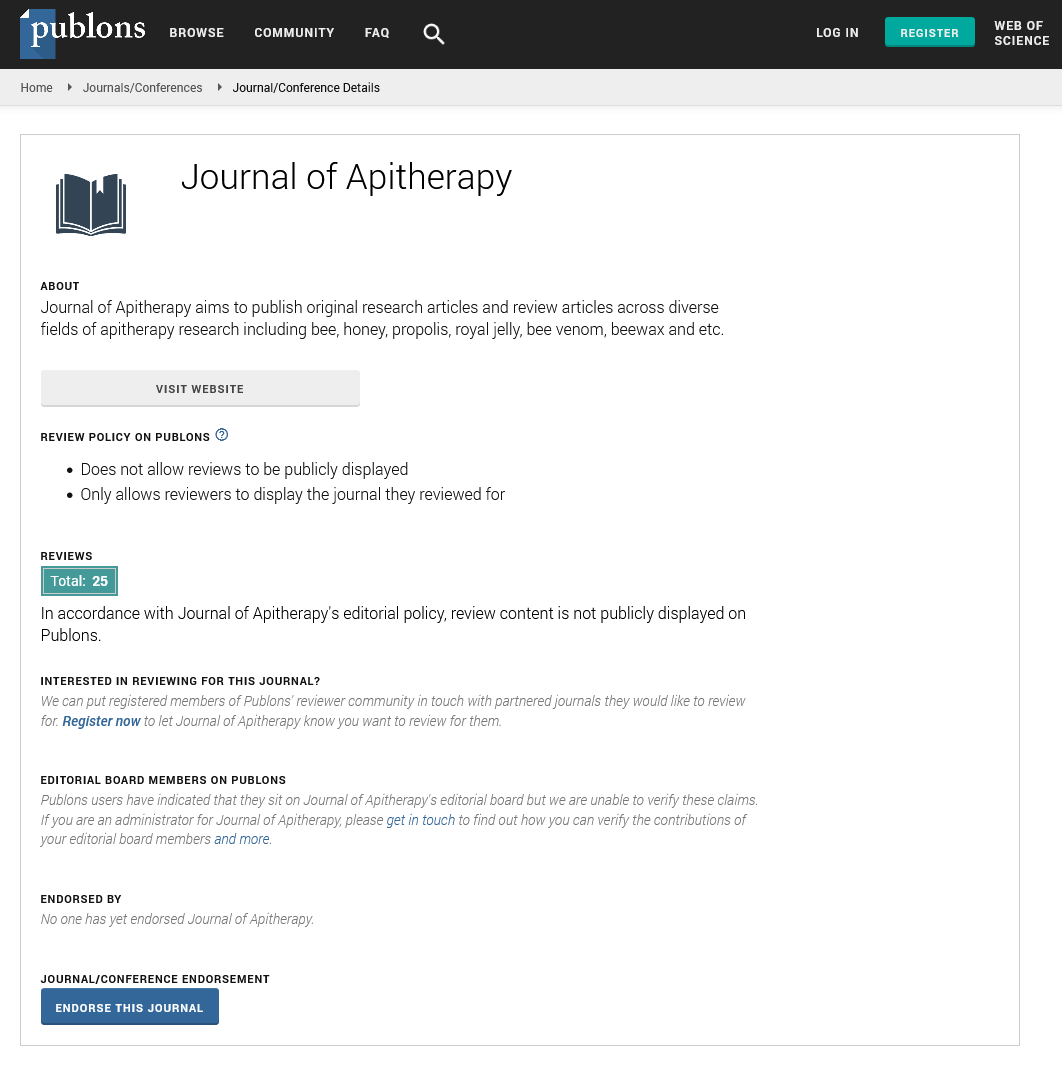Commentary - Journal of Apitherapy (2023)
The Therapeutic Potential of Bee Products in Apiary Medicine
Angelina Rosy*Angelina Rosy, Department of Pharmaceutical Sciences, University of Science and Technology, Chittagong, Bangladesh, Email: angelinaarosyy@gmail.com
Received: 03-Aug-2023, Manuscript No. JAPITHERAPY-23-112582; Editor assigned: 07-Aug-2023, Pre QC No. JAPITHERAPY-23-112582 (PQ); Reviewed: 21-Aug-2023, QC No. JAPITHERAPY-23-112582; Revised: 28-Aug-2023, Manuscript No. JAPITHERAPY-23-112582 (R); Published: 04-Sep-2023
Description
Apiary medicine, often referred to as apitherapy, is a fascinating and alternative branch of natural medicine that utilizes various bee products for their potential health benefits. This practice has been around for centuries, with historical records indicating its use in ancient civilizations like Egypt, Greece, and China. In recent years, apiary medicine has seen a resurgence in popularity as people seek natural remedies and holistic approaches to healthcare. This article explores the world of apiary medicine, its historical roots, key bee products, potential health benefits, and considerations for its safe and effective use.
Historical roots of apiary medicine
The use of bee products for medicinal purposes dates back thousands of years. Ancient civilizations recognized the healing properties of honey, bee venom, royal jelly, and bee pollen. Here's a brief look at their historical significance:
Honey: Honey has been used since ancient times for its wound-healing properties. Egyptians employed honey in the embalming process, and its medicinal use is documented in the Ebers Papyrus, one of the oldest medical texts, dating back to around 1550 BCE. Greek physicians like Hippocrates, the father of modern medicine, advocated for honey's therapeutic benefits.
Bee venom: Apitherapy using bee stings, also known as bee venom therapy (BVT), has roots in ancient Greece and China. Hippocrates mentioned the use of bee stings for joint pain and arthritis, while Chinese traditional medicine included bee stings to alleviate various ailments.
Royal jelly: Royal jelly, a secretion from worker bees used to feed the queen bee, was prized by ancient civilizations for its potential rejuvenating properties. It has a rich history in Chinese medicine and was reportedly used by Cleopatra to maintain her beauty.
Bee pollen: Bee pollen, collected by bees from flowers, has been consumed as a nutrient-rich food and medicine for centuries. It was a staple in the diets of many indigenous cultures.
Key bee products in apiary medicine
Apiary medicine encompasses several bee products, each with its unique composition and potential health benefits:
Honey: Honey is a natural sweetener with antibacterial, antifungal, and wound-healing properties. It is often used to soothe sore throats, coughs, and as a topical treatment for burns and wounds.
Bee venom: Bee venom contains a mixture of bioactive compounds, including peptides, enzymes, and amines. Bee venom therapy (BVT) involves controlled bee stings and is believed to have anti-inflammatory, analgesic, and immunomodulatory effects. It is used to alleviate conditions like rheumatoid arthritis and multiple sclerosis.
Royal jelly: Royal jelly is a creamy substance rich in proteins, vitamins, and minerals. It is commonly used as a dietary supplement to promote overall health, boost energy, and support the immune system. Some claim it has anti-aging effects.
Bee pollen: Bee pollen is a nutritional powerhouse, containing amino acids, vitamins, minerals, and antioxidants. It is consumed as a supplement to enhance energy, support the immune system, and potentially alleviate allergies.
Potential health benefits of apiary medicine
Apiary medicine enthusiasts believe that bee products offer various health benefits. While scientific research is ongoing, some potential advantages include:
Anti-inflammatory properties: Bee venom has been studied for its potential to reduce inflammation, making it a potential treatment for conditions like rheumatoid arthritis and osteoarthritis.
Pain relief: Bee venom therapy may provide pain relief for individuals with chronic pain conditions, although further research is needed.
Wound healing: Honey's natural antibacterial properties make it an effective topical treatment for minor cuts, burns, and wounds.
Immune support: Bee products like royal jelly and bee pollen are rich in nutrients that can support the immune system and overall well-being.
Allergy relief: Some individuals use bee pollen to alleviate seasonal allergies by gradually exposing their immune system to pollen allergens.
Energy and vitality: Royal jelly and bee pollen are often promoted as natural energy boosters.
Skin health: Honey and royal jelly may have skin-boosting properties, helping to maintain a healthy complexion.
Considerations for safe and effective apiary medicine
While apiary medicine shows promise, it's crucial to approach it with caution and seek guidance from healthcare professionals, especially if you have allergies or specific health conditions. Here are some considerations:
Allergies: Bee products can trigger allergic reactions in some individuals. If you are allergic to bee stings, bee pollen, or royal jelly, avoid using these products or consult with an allergist before trying them.
Dosage and administration: Ensure you follow recommended dosages and administration methods for bee products. For bee venom therapy, it's essential to work with a qualified practitioner.
Quality control: Choose high-quality, organic bee products from reputable sources to minimize the risk of contamination and ensure purity.
Consultation: Before incorporating bee products into your wellness routine, consult with a healthcare provider, especially if you have underlying health conditions or are taking medications.
Safety precautions: Bee venom therapy should only be administered by trained professionals who understand the appropriate dosage and monitoring.
Apiary medicine is a captivating and ancient field that harnesses the healing potential of bee products like honey, bee venom, royal jelly, and bee pollen. While its historical roots run deep, modern research is shedding light on their potential health benefits. However, it's essential to exercise caution and consult with healthcare professionals when considering apiary medicine, particularly if you have allergies or specific health concerns. When used safely and responsibly, bee products may offer a natural and holistic approach to healing and wellness, carrying on the age-old tradition of harnessing the power of the hive for human health.







